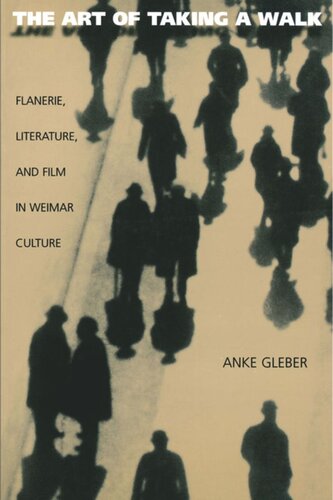

Most ebook files are in PDF format, so you can easily read them using various software such as Foxit Reader or directly on the Google Chrome browser.
Some ebook files are released by publishers in other formats such as .awz, .mobi, .epub, .fb2, etc. You may need to install specific software to read these formats on mobile/PC, such as Calibre.
Please read the tutorial at this link: https://ebookbell.com/faq
We offer FREE conversion to the popular formats you request; however, this may take some time. Therefore, right after payment, please email us, and we will try to provide the service as quickly as possible.
For some exceptional file formats or broken links (if any), please refrain from opening any disputes. Instead, email us first, and we will try to assist within a maximum of 6 hours.
EbookBell Team

5.0
90 reviewsAnke Gleber examines one of the most intriguing and characteristic figures of European urban modernity: the observing city stroller, or flaneur. In an age transformed by industrialism, the flaneur drifted through city streets, inspired and repelled by the surrounding scenes of splendor and squalor. Gleber examines this often elusive figure in the particular contexts of Weimar Germany and the intellectual sphere of Walter Benjamin, with whom the concept of flanerie is often associated. She sketches the European influences that produced the German flaneur and establishes the figure as a pervasive presence in Weimar culture, as well as a profound influence on modern perceptions of public space.
The book begins by exploring the theory of literary flanerie and the technological changes--street lighting, public transportation, and the emergence of film--that gave a new status to the activities of seeing and walking in the modern city. Gleber then assesses the place of flanerie in works by Benjamin, Siegfried Kracauer, and other representatives of Weimar literature, arts, and theory. She draws particular attention to the works of Franz Hessel, a Berlin flaneur who argued that flanerie is a "reading" of the city that perceives passersby, streets, and fleeting impressions as the transitory signs of modernity. Gleber also examines connections between flanerie and Weimar film, and discusses female flanerie as a means of asserting female subjectivity in the public realm.
The book is a deeply original and searching reassessment of the complex intersections among modernity, vision, and public space.